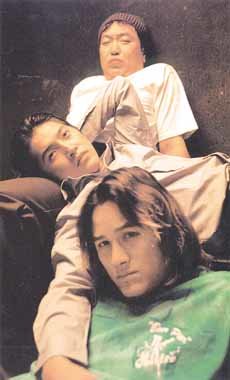`The Humanist,` Its Cynicism on Devilish Society
`The Humanist,` Its Cynicism on Devilish Society
Posted May. 07, 2001 09:09,

`The Humanists` is the debut movie of the director, Lee Moo-young, who has also careered as a scenario writer, a pop columnist, and a reporter.
Lee has played four roles at the same time: as an actor, a director, a music director, and a scenario writer. This movie definitely steps aside from the codes of previous Korean movies.
The narrative seems like a script of all devilish news, having covered the society section of our daily newspapers. Matthew (Ahn Jae-mo), who is a son of a wealthy retired general, made a plot for his friends to kidnap his father for money even though he is handsome and has grown up with no economic difficulties. However, his plan has gone astray with the wind.
The director Lee portrays the characters of the story with his unique sarcastic style. Matthew is such a person who believes money is everything. From his early ages, Matthew has learned and boned the lesson of the politics of money and the magic power of money. He did whatever he could do to be exempted from military draft. He believes that money could make him free even from the charge of police murder. Euglena (Kang sung-jin) and Ameba (Park sang-myun), who became Matthew’s friends for his money, betrays the typical complex of modern people. While Euglena who is a eunuch represents the impotence of modern people, Ameba who injured his brain represents the ignorance of them.
Obsessed by the power will, the impotent Euglena always dreams a rebellion while Ameba, who is possessed by servile spirits, blindly follows Matthew who satisfies his desire.
Matthew’s father (Park Young-kyu), who plays the upstarts millionaire, symbolizes the violent authoritarianism which is represented by the police and army in the movie. The lured step-mother is a symbol of the adulterous, being a parasite on the authoritarianism.
One more important point to note in this movie is its grotesque cultural codes. Bitten by the police, the swollen Ameba drinks three bowls of water drippings. Abruptly a beggar (Kim Myung-su) appears, dragging his rotten legs covered with maggots, and preaches "It’s an evil to waste the precious time of our short life for a bath."
It is probably a ridicule of the moderns who are pretending neat and clean but in fact their insides are corrupted and giving off a terrible stink.
The director Lee seems to recognize that he himself is not free from the criticism. He closes his movie with the final scene that a reporter, acted by the director, hangs himself in a pig-cage.
The best virtue of this move is the selection of music. On the main spindle of the music of an independent group `Earbu Band,` such as `Plowing Pigs,` `A lumber bridge` by the late Choi Moo-ryong, Nick Cave and the Badsis’s `Death Is Not the End,` `Connected` of Stereo MC, and trot, pops, even wraps tune into the mood of the movie. His selection of music produced truly the best original sound track among recent Korean movies.
Playing from May 12. G-18.
Kwon Chae-Hyun confetti@donga.com







